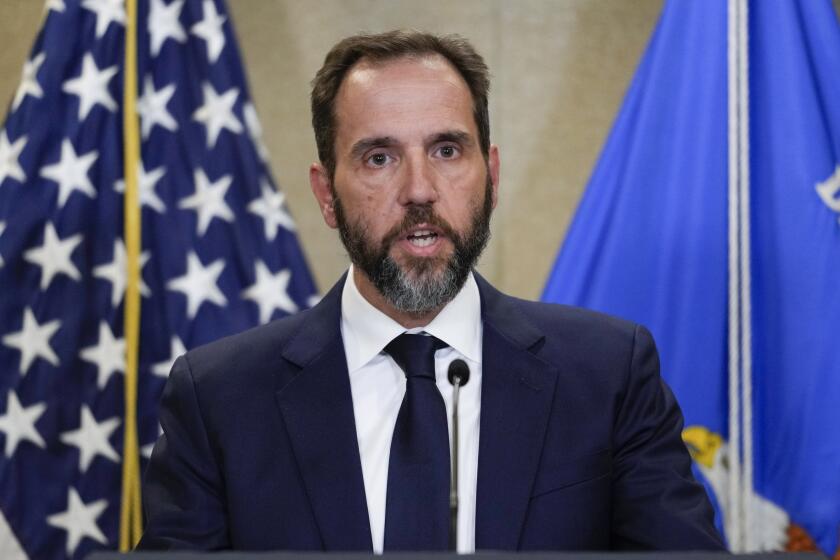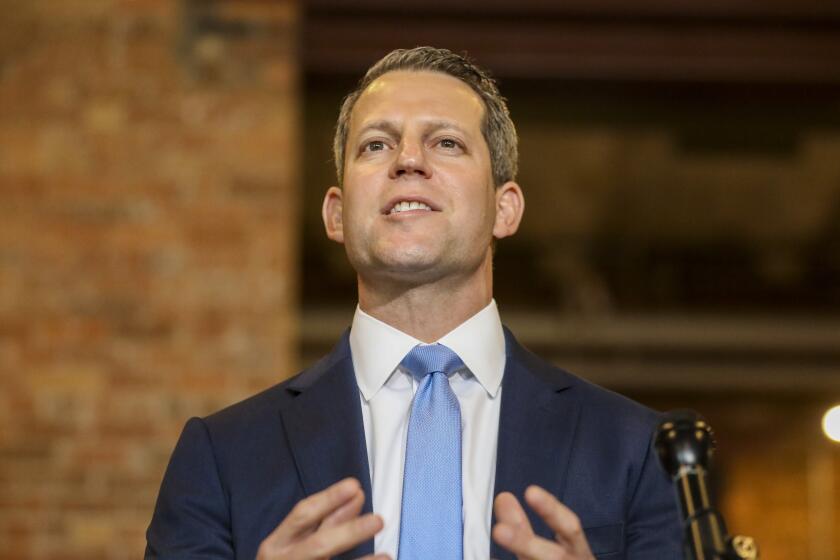Editorial: GOP hunt for ‘rogue’ prosecutors is attack on democracy

- Share via
Georgia is just one of many states in which Republican leaders have tried to throw out district attorneys elected in big cities where Democrats dominate. Florida, Pennsylvania, Missouri, Indiana and other states with Republican governors or Republican-majority legislatures are disenfranchising urban voters by stripping them of their power to elect their own prosecutors and set their own criminal justice agendas. It is not particularly surprising that much of the voting power they’re stealing— and many of the elected D.A.s they are targeting — are Black.
But the Georgia effort is particularly enlightening because it is targeting Fani Willis, the Fulton County district attorney who is prosecuting the ex-president and current candidate Donald Trump and 18 others for their alleged roles in attempting to overturn Trump’s 2020 reelection defeat. State Sen. Clint Dixon (R-Buford) branded Willis’ indictments a “witch hunt” and said he would file a complaint against her with a new commission with authority to remove her when it convenes for the first time next month.
The gambit is unlikely to succeed, but the attack on special counsel Jack Smith and his investigations is shameful.
To his credit, Brian Kemp, the state’s Republican governor, has declined to support the move against Willis. But the law he signed earlier this year allows the new Prosecuting Attorneys Qualifications Commission — some of whose members Kemp appointed — to question Willis’ prosecutorial decisions and impose “involuntary retirement.” Dixon and others dispense with the usual public safety pretext for ousting so-called rogue D.A.s and come very close to admitting that their motive in targeting Willis is political.
Which of course it is, as is virtually every democracy-crushing move by Republican statehouses to throw out elected prosecutors and silence voters who support them. This trend includes Florida Gov. Ron DeSantis’ recent groundless removal of State Atty. Monique Worrell, elected by voters in a district that includes Orlando, purportedly for not being aggressive enough in prosecutions. (“State attorney” and “district attorney” describe identical or similar offices in different states.) It includes the governor’s similar removal of Andrew Warren, the elected prosecutor from the district that includes Tampa, and DeSantis’ predecessor stripping power from Aramis Ayala, the elected prosecutor who preceded Worrell.
Florida Gov. Ron DeSantis’ unconstitutional removal of an elected prosecutor is just the tip of a Republican spear that seeks to harm criminal justice reform, Democrats, the Black vote and democracy itself.
It’s the same story in Pennsylvania, where the Republican-dominated legislature tried to impeach Philadelphia Dist. Atty. Larry Krasner. And in Missouri, where a bill that would have allowed state officials to throw out St. Louis’ D.A. was amended to extend that power over all D.A.’s, so the anti-urban, anti-Democrat, anti-Black power grab wouldn’t look quite so obvious. It’s the same story, too, in a dozen other states that recently passed similar laws, ostensibly to protect voters from themselves.
Republicans for a time were leaders in the criminal justice reform movement, drawing on Christian values of redemption and fair play and conservative principles of limited government and economic discipline. Trump never signed on with the conservative Right on Crime effort, whose proponents included Newt Gingrich and other prominent Republicans. As president, though, Trump briefly aligned himself with reforms like more humane sentences when he signed the bipartisan First Step Act, a 2018 law improving federal sentencing practices.
Opponents of progressive prosecutors are abusing governmental oversight powers to undermine voter decisions. But the innovative new breed of D.A.s is holding firm.
But there was never a second step, because after the murder of George Floyd and the sometimes violent protests that followed, Trump reverted to the tough-on-crime rhetoric that characterized much of his career as a public figure. His political acolytes and underlings fell into line — and shrewdly portrayed themselves as protectors of public safety in the face of progressive prosecutors and “woke” policies that are meant to correct longstanding flaws in the criminal justice system, such as unnecessarily extreme sentences, racial bias in plea bargaining and bail, and lax prosecution of serious police misconduct.
Local voters who want these reform policies elect D.A.s that promote them. Those that don’t, don’t. Moves like the new law in Georgia and DeSantis’ removals in Florida eliminate those choices.
Neither should anyone else. Cash bail is profoundly unjust for people facing criminal charges who don’t have money, and a pointless ritual for people, like the former president, who do.
The dangers posed by this anti-democratic movement are manifold. Most obviously, it virtually erases the voting power of a wide swath of voters, chiefly those who are Democrats, urban dwellers or Black. It robs them just as surely as intimidation at polling places once did, and as partisan gerrymandering still does. It quite literally overturns elections. It insidiously succeeds where Trump and his followers fell short following their 2020 defeat. It undermines confidence in American institutions, in elections, in the value of voting. It turns every core function of democracy into a politically partisan battle.
Trump was indicted in part because of his Jan. 2, 2021, phone call to Georgia Secretary of State Brad Raffensperger, demanding that the Georgia official “find” him enough votes to secure a different outcome. Georgia remains the battleground — one of them, anyway — in this Republican attack on democracy. The attempt to unseat Fani Willis — or Monique Worrell, or Andrew Warren, or Larry Krasner, or numerous others — is merely an alternative way to achieve what rioters in the Capitol were seeking on Jan. 6, 2021.
More to Read
A cure for the common opinion
Get thought-provoking perspectives with our weekly newsletter.
You may occasionally receive promotional content from the Los Angeles Times.














